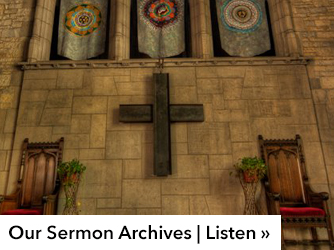Kanye West and Jay-Z are no doubt names you have heard, though I’d be shocked (and pleasantly surprised) if you came to me next Sunday reciting any of their lyrics.
Their most recent collaborative project, Watch The Throne, is fun, unapologetically boastful, boisterous, and (my favorite) “provocative.” Take for example the lyrics to the opening song, “No Church in the Wild”:
Human beings in a mob
What’s a mob to a king?
What’s a king to a God?
What’s a God to a non-believer, who don’t believe in anything?
Will he make it out alive? No church in the wild.
Then more…”lies on the lips of a priest”…then more…”We formed a new religion, no sins as long as there’s permission”…like I said, provocative. The idea is simple: money and personal desire are the new religion in this “wild” world we live in. They use their album to pray constantly to these new gods, and speak great truth between the lines. It is indeed hard to fully possess a faith that encourages sober thinking and humble lifestyle choices in today’s culture. It is far easier to justify one’s innate drives, whether selfish or well-intentioned, under the guise of, “This world is too wild and unstable to depend on any vision other than my own.” This is the aspect of Humanist thought that is most frustrating: beyond the goodness and potential, humanity is inherently broken. The “bootstraps” morality of songs like “No Church in the Wild” cannot escape the futility of trying to hold water in a broken glass.
It requires no Christian formation of anthropology but a cursory look at human history to see the flaws. But what Kanye West and Jay-Z do, as do so many others, is remove the space for God, abandon those “religious” moments of personal reflection, and instead absorb the wild into their very being. They assume the traits of the wild to better navigate in it. From an ecological or Darwinist view, they adapt to survive. From a Liberation or Group Psychology view, they have become the oppressor.
All fascinating stuff, but there is an alternative. At least from the view of religion, Lent is the season where we pause in the wild for a moment of personal reflection. We look at what we (and our dealings, i.e. society) have become, and instead of assuming that the wilderness is some unimpeachable Wild, we take the stance of faith: broken, but not beyond repair. The six weeks is a period of reflection and repair, to look at our “sin” or whatever keeps us distant from God, and to seek redemption. The good sense of the Hebrew and Christian canons teach us the same thing, over and over again: Through God, we are stronger than any oppressor.
We are going to have church in the wild. During this season we will spend some time in the various wildernesses of our collective and individual being. Those places we have ignored. Those habits and attitudes that have become mundane. Those vacancies we walk past. It is right that we destroy the false idols and repair the abandoned buildings of our soul. This is why Jesus came. From Ash Wednesday to Good Friday and on to Easter, this is the work of University Church.


